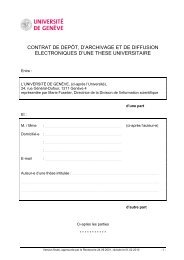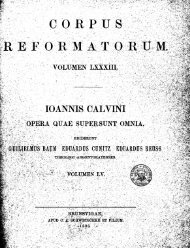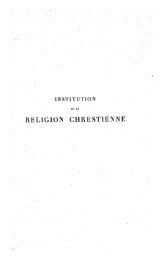GE Biblioth. pub. et univ - Archive ouverte UNIGE
GE Biblioth. pub. et univ - Archive ouverte UNIGE
GE Biblioth. pub. et univ - Archive ouverte UNIGE
Create successful ePaper yourself
Turn your PDF publications into a flip-book with our unique Google optimized e-Paper software.
617 ADDENDA ET CORRI<strong>GE</strong>NDA. 618<br />
costé selon la mesure de grace quil luy<br />
plaira me donner, pour laquelle chose ie vous<br />
prie tous le vouloir supplier <strong>et</strong> aussi pour<br />
l'advancement <strong>et</strong> prospérité de nostre dite<br />
assemblée. Et pareillement vous ne serez<br />
oubliez en noz oraisons: Aidant le Seigneur<br />
Eternel lequel ie prie, Messieurs, nous augmenter<br />
ses graces <strong>et</strong> enrichir de ses benedictions<br />
spirituelles par nostre maistre <strong>et</strong><br />
souverain seigneur Iesus Christ son bien<br />
aymé filz auquel avec luy <strong>et</strong> le Sainct Esprit<br />
soit gloire honneur <strong>et</strong> Empire éternellement.<br />
De L. ce 2. de febvrier 1559.<br />
Messieurs, ie ne veux pas oublier de me<br />
recommander bien humblement a voz bonnes<br />
graces <strong>et</strong> sainctes prières.<br />
Vostre humble serviteur<br />
Debonvouloir.<br />
C'est pour deux raisons que nous recopions<br />
c<strong>et</strong>te l<strong>et</strong>tre d'après l'original. D'abord<br />
celui-ci fait disparaître le ministre Paur créé<br />
par Crott<strong>et</strong>, <strong>et</strong> le remplace par ce même<br />
Pane dont nous avons trouvé le nom (sans<br />
en être toujours bien sûr) 2540. 3763. 3810,<br />
<strong>et</strong> qui portait aussi le nom de Porusson<br />
N. 2429. Toutes nos hésitations <strong>et</strong> conjectures<br />
tombent donc devant ce texte. En second<br />
lieu la date complétée d'après le manuscrit<br />
(De L.) paraît être en contradiction<br />
avec la note 1 de notre première édition, où<br />
nous avons cru pouvoir supposer que la<br />
l<strong>et</strong>tre était écrite de S. Maixent. H est évident<br />
que Crott<strong>et</strong> ne savait que faire de c<strong>et</strong><br />
L. <strong>et</strong> que Lièvre n'a pas connu la l<strong>et</strong>tre,<br />
puisqu'il ne sait rien de Pane.<br />
Quant à ce qui est dit dans la même<br />
note de Dupont, c'est également une fausse<br />
combinaison. (Voyez l'Index.)<br />
3023. De Maurisio v. ad N. 1526.<br />
3035. De Io. de Bosco v. supra ad N. 2969.<br />
3061. Hispanus ille quem h. 1. Calvinus Gaucheriano<br />
commendat Antonius del Corro fuit<br />
de cuius vita Vir clar. Edu. Boehmer nobis<br />
haec tradit:<br />
Corro spent some time at Geneva and Lau<br />
sanne. When in Navarra some liberty was given<br />
to the gospel, he went there with an introduction<br />
from Calvin dated May 26. 1559 to La<br />
Gaucherie at Nerac, the tutor of the future<br />
of the same year, to promote this work by a<br />
l<strong>et</strong>ter to the ministers of that region [N. 3266],<br />
Some weeks ago auto-da-fe's had taken place<br />
at Sevil and Valladolid . ... I do not doubt<br />
that Corro is the man on whom Calvin writes<br />
the following: Accessit altera differendi ratio<br />
quod hie bonus vir aliquam sibi commendationem<br />
dari rogabat <strong>et</strong>c Redeo ad nuncium.<br />
Hispanus est <strong>et</strong>c. At the words: Literas<br />
ad Regem [not. 5] the editors remark:<br />
Non exstant. I think on the contrary it is<br />
the undated l<strong>et</strong>ter printed N. 2819. A passage<br />
from it serves my special task: Le present porteur<br />
[Note 3], (Guerens, according to my combination)<br />
suyvant quelques propos <strong>et</strong>c.<br />
3063. De Stephano Gragnon nobis testis est Vir<br />
doctus in Bull<strong>et</strong>in VEIL 75, qui eum in<br />
oppidum Sarlat (Dordogne) missum dicit.<br />
Cf. <strong>et</strong>iam quae ad N. 3990 annotavimus.<br />
3080. Des Gontes vitiose scriptum credimus <strong>et</strong> virum<br />
eundem fuisse ac ilium qui N. 3785 Hier.<br />
des Gouttes nominatur. Laudatur aliquis<br />
huius nominis fugitivus post caedem Bartholomaicam<br />
in Bull<strong>et</strong>. X. 233.<br />
3160. Nos in nomine Fontani haesisse vix est<br />
quod mireris. Plures fuere qui vel proprio<br />
suo nomine vel ascititio La Fontaine, Fontanus,<br />
a Fonte, <strong>et</strong> similibus veniebant (v. in<br />
Indice) ut haud facile singulis in locis eos<br />
distinxeris. Quum in subscriptione huius<br />
epistolae R. praenomen legator, iam de Roberto<br />
potissimum cogitamus qui alias Le<br />
Masson vocabatur.<br />
3168. Lusenius idem esse vid<strong>et</strong>ur ac ille qui N.<br />
2981 Luszenski vocatur, olim in Helv<strong>et</strong>ia<br />
aliquamdiu commoratus.<br />
3179. Gelinus aliquis occurrit <strong>et</strong>iam N. 1406.<br />
3182. Ed. Boehmer iam aliam nobiscum sententiam<br />
communicat. Scribit enim 1. 1.: As for the<br />
year of Corro's l<strong>et</strong>ter, I formerly could only<br />
arrive to the conclusion that it must have been<br />
written about 1560, and the editors of the<br />
Calvin l<strong>et</strong>ters have placed it under this year.<br />
But after having got knowledge of the just<br />
mentioned l<strong>et</strong>ter of Calvin (N. 3061) I do not<br />
doubt that it was written after Corro's demand<br />
from Lausanne. Consider also what is said<br />
in both on Le Gay.<br />
3214. 3219. Errore bibhopegi incaute decepti duo<br />
fragmenta eiusdem epistolae seorsim colloca-<br />
vimus, quae evidenter ad unam eandemque<br />
Icing Henry, son of Jeanne d'Alir<strong>et</strong>. Corro was pertinent.<br />
made moderator of the city college at Aire on 3255. In fine laudatur Mercurius aliquis qui literas<br />
the Adour. Invited by fugitive Spaniards to ex Polonia afferebat. Is N. 3287 Gallus di-<br />
assist their congregation at Bordeaux he ashed citur, <strong>et</strong> N. 3309 a Mercurinis vocatur. Ex<br />
Calvin, in a l<strong>et</strong>ter dated Bordeaux Oct. 27. quo incunotanter eum cum illo componimus
















